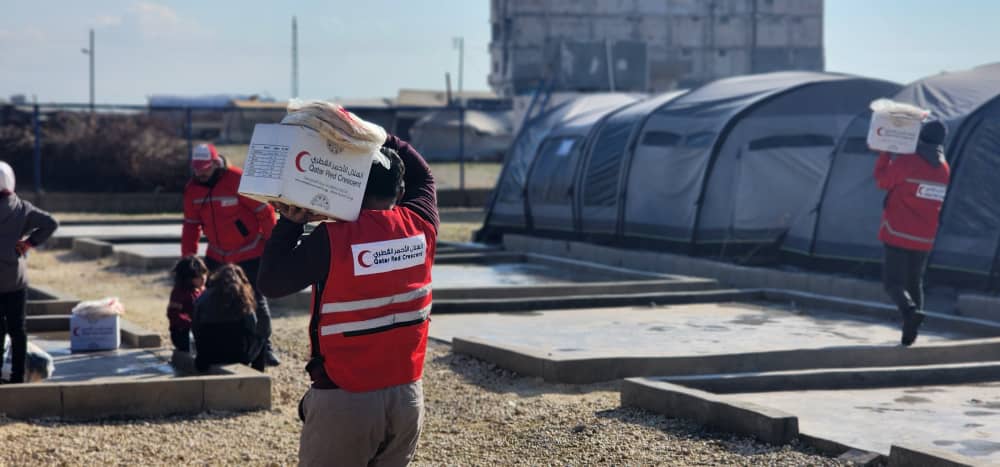The Turkey-Syria earthquake took the lives of more than 15,000 people, and the search is still ongoing.
Qatar’s Red Crescent Society has allocated a major $1 million from its Disaster Response Fund for immediate relief efforts, the organisation confirmed on Wednesday, as the death toll surpassed 15,000.
At least 12,391 people have died in Turkey, while Syria documented at least 2,992 deaths since Monday. Tens of thousands are also believed to be injured as rescue operations continue to race against time to pull survivors trapped under the rubble.
So far, four mobile clinics were deployed by QRCS’s representation mission in Turkey to Jisr Al Shughur, Al Dana, western Aleppo countryside, and Idlib to offer affected people at makeshift shelters emergency medical services (EMS) and psychological support.
Dedicated staff from the mission’s field are currently deployed to help with Syria’s search and rescue efforts, given the lack of resources and aid to the war-torn country.
Medical personnel from Doha are also expected to fly soon to northern Syria to provide EMS to the victims and support hospitals and health centres in the specialties of general surgery, emergency medicine, orthopaedics, paediatrics, ophthalmology, anaesthesia, and mental health.
Per estimations, the organisation’s recent efforts and donations are expected to help over 10,000 people from both countries.
In an effort to increase the scope of the humanitarian relief effort in the areas of food, water, sanitation, shelter, and health care, a USD10 million fundraising campaign was also launched to help those affected.
Other Qatar-based charities are also lending a hand to support the victims during the tragedy.
On Wednesday, the Qatar Fund for Development successfully transported 108 tonnes of urgent aid onboard three planes to earthquake-stricken Turkey and Syria. The donations were transported with the help of both QRCS and Qatar Charity.
In addition, the Gulf nation allocated 10, 000 mobile homes for those affected by the earthquake in both countries just hours after Qatar’s amir announced an air bridge to transport humanitarian aid.
A team from Qatar’s Internal Security Force (Lekhwiya) are also on the ground assisting with search and rescue operations in conjunction with local Turkish authorities across earthquake-affected regions of southern Turkey.
Categorised as one of the region’s worst natural disasters in decades, the 7.8 magnitude earthquake and 7.5 magnitude follow-up on Monday turned hundreds of buildings to rubble within minutes.
‘Smell of death everywhere’
Rescue operations are still underway in both nations as survivors struggle to find food and shelter.
Residents in rebel-held areas of northwest Syria told Al Jazeera that while nations from all over the world have sent rescue teams and supplies to earthquake-stricken Turkey, not much of that aid has reached Syria.
“I call on the international community, the Arab countries and the United Nations to urgently help us,” said medical volunteer Obaida Rannoush, who was standing by the Bab al-Hawa border crossing between Turkey and Syria.
The situation in rebel-held northwest Syria is described as “tragic” and permeated with “the smell of death” by the Syrian Civil Defence organisation, which is requesting more search and rescue tools.
There is a severe lack of search and rescue equipment as the 72-hour mark for rescue operations approaches, he added.
Across the border on Wednesday, President Tayyip Erdogan acknowledged that his administration’s initial response to the devastating earthquake in southern Turkey was not at its highest.
His comments came amid rising criticisms from those who had been left without much assistance and frustrated over the rescue teams delayed arrival.
However, the president stated on a visit to the disaster zone that operations were “now working normally” and promised no one would be left without shelter.
According to Turkish officials, 13.5 million people were impacted over a 450 km stretch from Adana in the west to Diyarbakir in the east.
People were killed in Syria 250 kilometres to the south in Hama. Some of those who perished in Turkey were war refugees from Syria.







